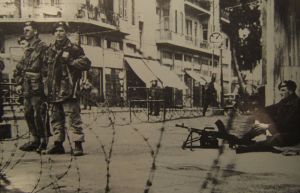This past Tuesday night, my wife and I dined at a small Parisian restaurant we’d stumbled on almost thirty years ago, and which, I’m happy to say, is just as good as it was then. Since we were feeling romantic and happy with the world, I told the maître d’ how his establishment had figured in our lives. Our first visit happened the same week I asked my wife to marry me; our second, some years later, occurred when she was pregnant with our elder son.
The maître d’ thanked us profusely. “What you’re telling me gives me goose bumps,” he said. He added that what mattered most to his colleagues and him was the passion to prepare and serve food the way it should be done. I said that what was on the plate proved the point; he beamed and said he was touched.
Two days later, back in Seattle, we read about the massacre at Nice. I can’t tell you how revolted, heartsick, and incredulous I feel, how outraged. Among other things, to me, France represents the love for and appreciation of the beauty that makes life more fulfilling. It’s as the maître d’ said, the understanding that even a snippet of the everyday should be created just so, as if there were no excuse for ugliness. Not that there’s no ugliness in France; of course there is, and plenty of it, not least the bigotry and xenophobia that poison public discourse. But you’ll also see there the passion this man was referring to: a moment, an interaction, a way of being that says, This is what life’s about.
During our trip, we encountered many examples of this. A Tunisian market-stall merchant in Dijon urged us to sample his olive oil, easily the best I’ve ever tasted, and when I said so, he wound up telling us about his life and why he’d emigrated to France. An elderly couple who run a bed-and-breakfast in Bourges embraced us when our three-day stay ended and said they’d miss us. Why? I think it’s because we expressed admiration for their city and the care with which they renovated the ancient building that’s their home.
The Paris métro, like any other hole in the ground through which trains run incessantly, is noisy, grimy, and sooty, and the ads are loud and garish, like ads everywhere. But take a closer look at them, and you’ll see that their borders are ornate ceramic tile. Who thought to bother, and why? Who decided, way back when, to name the stations after historical figures or events and decorate them accordingly? Then again, back further when, who thought that a cathedral spire needed meticulously carved ornaments so high above the ground?
The terrorists’ response? Blow it up. Run it over. Shoot it. Hate it. Like any sociopath who fears himself impure and worthless, they see only filth, depravity, sin, which must be wiped out. A café, for instance, isn’t a social hub but a place where men and women mingle freely over alcohol. But it takes a particular sickness to translate that belief into action, to decide that a certain lifestyle, and the freedom to choose it, aren’t merely different or new but an insult, one that can be assuaged only by murder.
I grieve for Nice, for France, for the world we live in.


